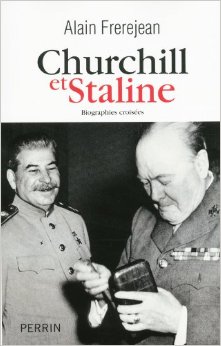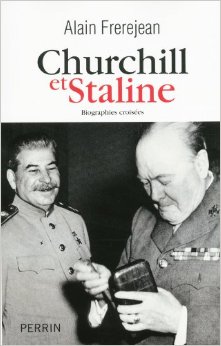
Finest Hour 168
Books, Arts & Curiosities – Churchill et Staline: Biographies croisées

September 9, 2015
Finest Hour 168, Spring 2015
Page 44
Review by Antoine Capet
Alain Frerejean, Churchill et Staline: Biographies croisées. Paris: Perrin, 2013. Paper. 506 pages. ISBN 9782262037970. €24.00
 The “parallel lives” format is now a well-established one, after Alan Bullock’s pioneering Hitler and Stalin (1991) and Andrew Roberts’s Hitler and Churchill (2003). This book follows what we could call a Y-structure, with two separate branches merging into one. Thus, in Part I, “Churchill’s unhappy youth” (Chapter 1) is followed by “Stalin’s unhappy youth” (2); “Churchill’s unruly adventures” (3) by “Stalin’s unruly adventures” (5), and so on. It is in Part II that their paths start to converge, with “Churchill against the Bolsheviks (1) and “Stalin’s irresistible rise” (2).
The “parallel lives” format is now a well-established one, after Alan Bullock’s pioneering Hitler and Stalin (1991) and Andrew Roberts’s Hitler and Churchill (2003). This book follows what we could call a Y-structure, with two separate branches merging into one. Thus, in Part I, “Churchill’s unhappy youth” (Chapter 1) is followed by “Stalin’s unhappy youth” (2); “Churchill’s unruly adventures” (3) by “Stalin’s unruly adventures” (5), and so on. It is in Part II that their paths start to converge, with “Churchill against the Bolsheviks (1) and “Stalin’s irresistible rise” (2).

2024 International Churchill Conference
Finest Hour readers will not discover anything new about Churchill in the early chapters, which are based on familiar second-hand sources, though they may learn quite a few nauseating details about Stalin’s attitude to his numerous wives and lovers, the children who resulted, and the long list of former revolutionary associates whom he sent to their death. The real meat of the volume starts with the increasingly worrying question of how to deal with Hitler’s evident expansionist ambitions—there the preoccupations of the two begin to converge, but with radically different conclusions on the approach to adopt.
Frerejean is very good on how Churchill tried to befriend and warn Stalin, who had not understood Chamberlain’s lesson that one could never trust Hitler. However, “there’s none so deaf as those who will not hear,” Frerejean convincingly argues. There is also excellent coverage of what after all had to be one of the central passages of the book, the Moscow Conference of August 1942: the first meeting between the two men. The text here is largely derived from the relevant chapter, “The Ogre in his Den,” in Martin Gilbert’s Road to Victory, 1941–1945. One has to bear in mind that the late Sir Martin’s volumes of the Official Biography were never translated into French (only the first two volumes by Randolph)—so French readers now benefit from at least some of the first-hand testimonies included.
Frerejean’s treatment of the next meeting in Moscow in October 1944—with the notorious “percentages” agreement on Greece and the Balkans—are similar in that no new material is included, and likewise for Yalta. The author’s real personal intervention only appears in his choice of sources, which aim to show that Churchill had no choice over Poland, for instance, since Roosevelt played a double game: the wily President made sure that he did not alienate Polish Americans during the election campaign in 1944, but at the same time he was prepared for a sell-out to Stalin if this could induce him to declare a firm commitment to Soviet entry into the war against Japan. With his reelection secure, Roosevelt was no longer interested in the fate of the peoples of Europe—unlike Churchill, whose country however was much too weak to enable him to confront Stalin alone.
In the final months of the war and at Potsdam, Churchill is shown alternating between distrust and naivety vis-à-vis Stalin, always depicted as the master manipulator. Unsurprisingly, the final chapters describe the widening gap between the two former wartime leaders, with an insistence on Stalin’s increasing ruthlessness, cruelty, and paranoia: the two branches of the Y are there again, diverging more than ever.
This is not a bad book, but I was often irritated by the lack of footnotes giving authority to the words attributed to Churchill, and we all know how many apocryphal “Churchill quotes” are around. Let us, however, end on a hilarious howler that would not, I suppose, have displeased the Great Man: when Frerejean mentions his slippers, he describes them as sporting the embroidered letters “WC.”
Subscribe
WANT MORE?
Get the Churchill Bulletin delivered to your inbox once a month.


